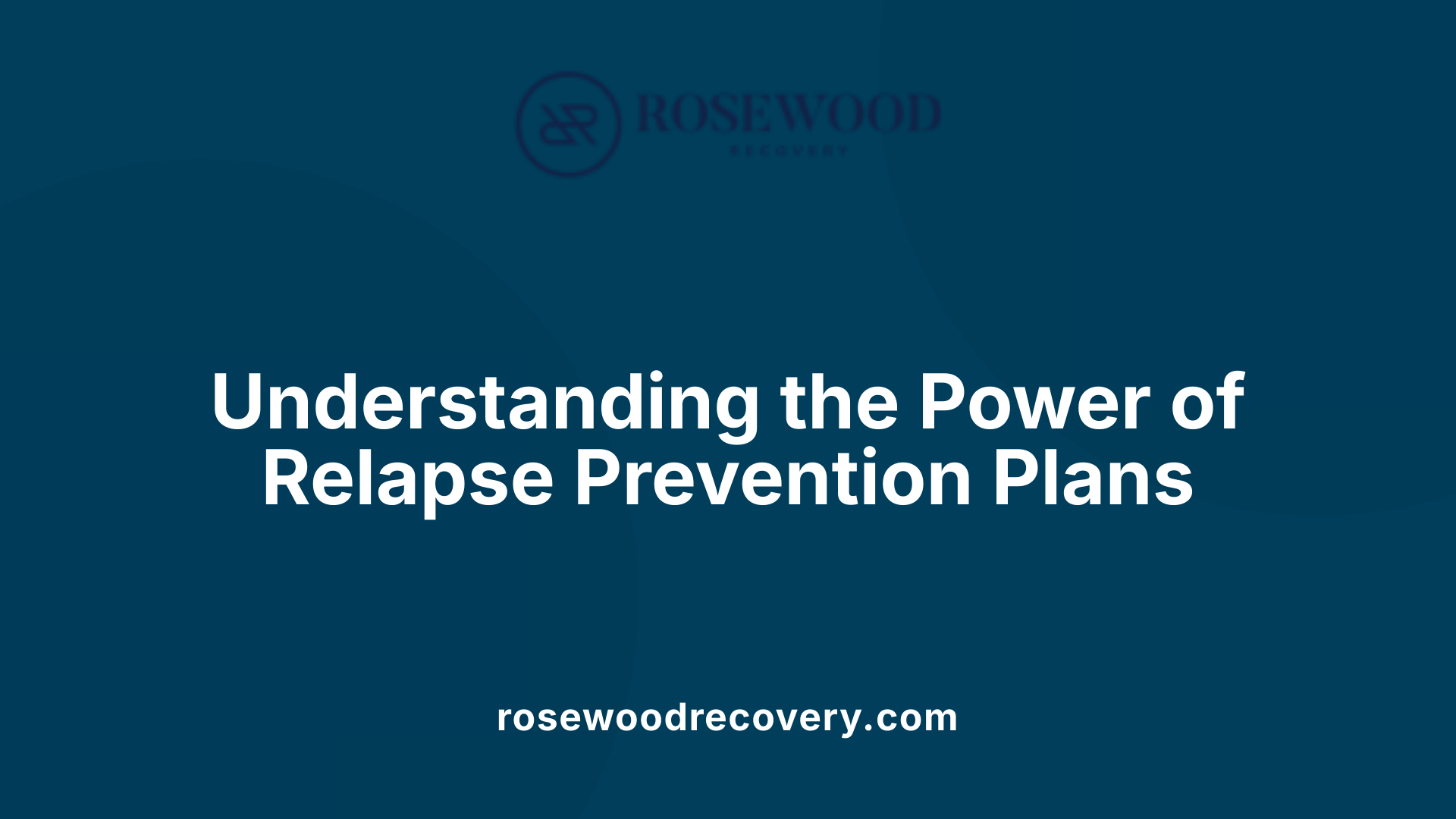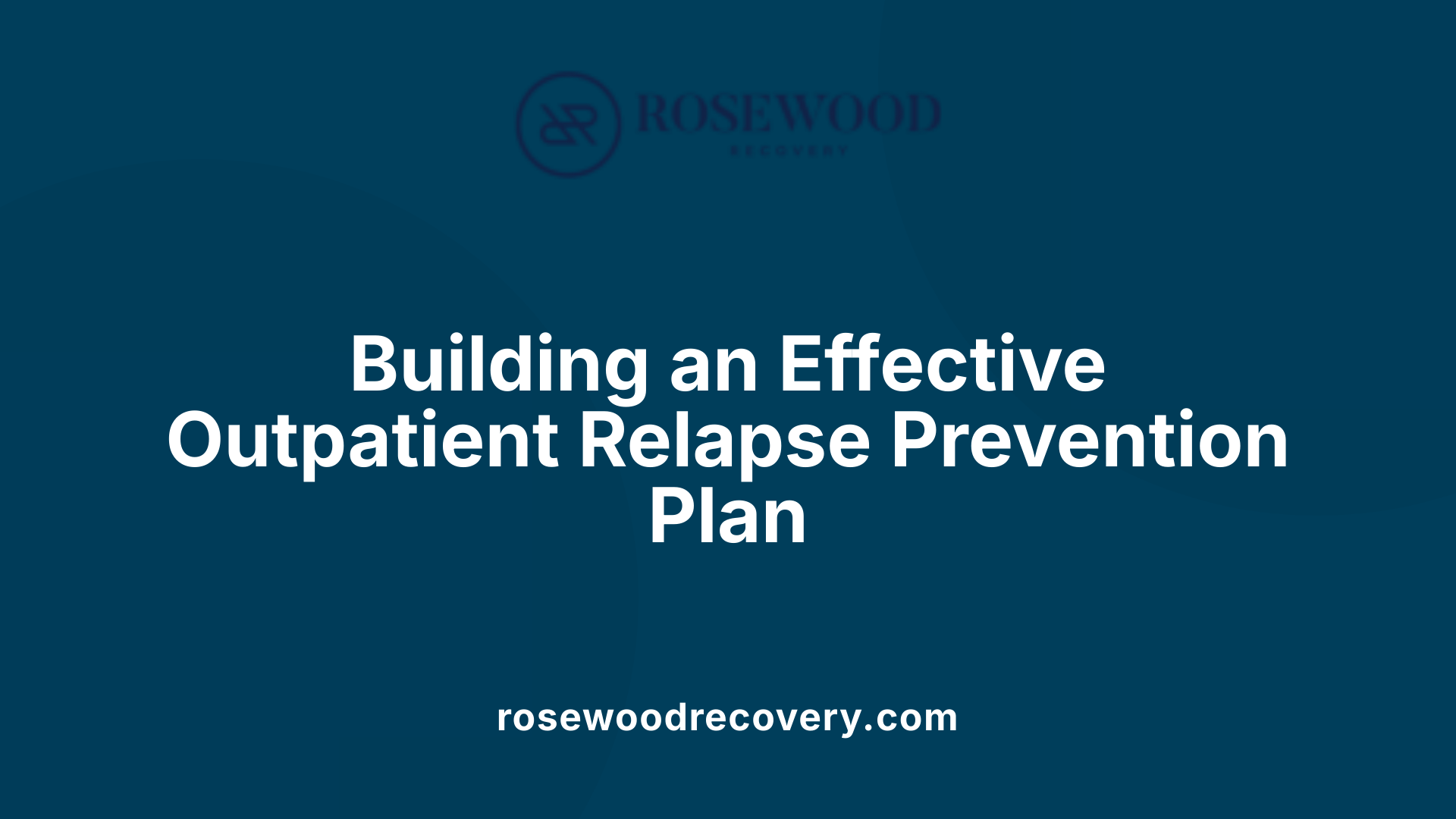Understanding the Foundations of Relapse Prevention in Outpatient Settings
Relapse prevention is a cornerstone of effective outpatient addiction treatment, aimed at equipping individuals with the skills, knowledge, and support networks necessary to maintain sobriety. Given that relapse occurs in 40-60% of individuals during recovery, structured plans are essential to address the psychological, emotional, and behavioral triggers that threaten sustained abstinence. This article explores the components, strategies, and impacts of relapse prevention plans within outpatient programs, highlighting their vital role in improving treatment outcomes.
Defining Relapse Prevention Plans and Their Function in Outpatient Care
Relapse prevention plans are tailored strategies created to help individuals sustain their sobriety after completing addiction treatment. These plans focus on recognizing potential triggers—such as stress, social situations, or emotional upheavals—and employing coping techniques to manage cravings and prevent relapse.
In outpatient programs, these plans are an integral part of ongoing recovery efforts. They encompass various approaches, including evidence-based therapies like cognitive-behavioral therapy (CBT), which helps clients identify and alter negative thought patterns linked to substance use. Medication management may also be incorporated, especially for opioid dependence, with drugs like naltrexone or methadone supporting abstinence.
Support systems are vital components of relapse prevention plans. Participants often engage in peer support groups like Alcoholics Anonymous (AA) or Narcotics Anonymous (NA) to build community and accountability. Regular monitoring through drug screens and self-reporting ensures early detection of potential relapse signs.
These plans emphasize skill development—such as mindfulness, stress management, and problem-solving—to empower individuals with tools to face high-risk situations confidently. Education about the effects of substances on the mind and body further enhances self-awareness.
Overall, relapse prevention plans serve as comprehensive frameworks that combine therapy, medication, peer support, and self-care strategies. They aim to create a supportive environment where clients can recognize early warning signals and employ effective techniques, ultimately increasing the likelihood of long-term sobriety.
Strategies and Integration of Relapse Prevention in Outpatient Programs
 Relapse prevention is a central part of outpatient addiction treatment, embedding strategies that help individuals sustain their recovery over time.
Relapse prevention is a central part of outpatient addiction treatment, embedding strategies that help individuals sustain their recovery over time.
Psychosocial therapies like cognitive-behavioral therapy (CBT), motivational interviewing, and mindfulness-based relapse prevention are crucial components. These therapies assist patients in recognizing and managing their high-risk triggers, emotions, and thoughts that could lead to relapse. For example, CBT helps reshape negative thought patterns and develop healthier responses to stress and cravings.
Medications also play a role in reducing the risk of relapse. Drugs such as naltrexone, disulfiram, acamprosate, and bupropion are prescribed based on the substance of choice and individual needs. They work by decreasing cravings or creating unpleasant reactions to substance use, thereby deterring relapse.
Monitoring tools like urine drug screens, breathalyzers, and hair follicle tests are used regularly to detect early signs of relapse, allowing for prompt intervention.
Support groups, including Alcoholics Anonymous (AA), Narcotics Anonymous (NA), and SMART Recovery, provide peer support and accountability. These groups foster community bonds, which are vital for long-term sobriety.
Ongoing education is also important; programs often include worksheets, relapse prevention plans, and skill-building exercises that patients can continue implementing after formal treatment ends.
An interprofessional healthcare team—comprising physicians, nurses, counselors, and pharmacists—coordinates care, monitors progress, and adjusts strategies as needed. This comprehensive approach ensures that relapse prevention remains adaptable and personalized, increasing the likelihood of lasting recovery.
Together, these integrated strategies empower individuals with the tools, support, and confidence to manage challenges, ultimately reducing the chances of relapse during and after outpatient treatment.
The Crucial Role of Relapse Prevention Plans in Sustaining Sobriety

Why are relapse prevention plans important for maintaining sobriety in outpatient settings?
Relapse prevention plans are a cornerstone of long-term recovery, especially in outpatient programs. They are personalized strategies designed to help individuals recognize triggers, manage cravings, and navigate high-risk situations outside the structured environment of therapy sessions.
In outpatient settings, individuals face everyday challenges and social pressures that can threaten sobriety. Therefore, having a tailored plan equips them with practical tools like stress reduction techniques, lifestyle modifications, and support network engagement. These tools enable individuals to take proactive steps, reducing the likelihood of relapse.
A well-developed relapse prevention plan also emphasizes early detection of warning signs, such as emotional or mental shifts, which can precede physical relapse. By identifying these signs early, individuals can implement coping strategies promptly, preventing a full relapse.
Support systems play a critical role within these plans; involvement in peer groups, ongoing therapy, and community resources bolster resilience. Education about how addiction manifests and how to counteract it fosters self-awareness and confidence.
Overall, relapse prevention plans are essential for staying committed to sobriety amid life's stressors and triggers. They serve as personalized roadmaps, guiding individuals in maintaining long-term recovery and improving their quality of life.
Educational Aspects of Relapse Triggers and Management

What educational insights are typically provided about relapse triggers, prevention strategies, and relapse management in outpatient programs?
Outpatient relapse prevention programs focus heavily on educating individuals about the various factors that can lead to relapse. Participants learn to identify both psychological and social triggers, such as experiencing significant stress, emotional distress, or being in environments linked to previous substance use.
One core aspect of education involves developing coping strategies tailored to each person. These include mindfulness practices, relaxation techniques, and problem-solving skills designed to manage cravings and navigate risky situations effectively. Recognizing early warning signs, such as emotional withdrawal or craving intensification, helps individuals intervene before a full relapse can occur.
Programs also emphasize that relapse is a common part of the recovery journey. It is viewed as an informative process, offering opportunities to re-evaluate personal coping mechanisms and recovery plans. Understanding this normalcy reduces feelings of shame and encourages persistent efforts.
Furthermore, the role of social support—like family involvement, peer groups, and ongoing therapy—is underscored for its importance in sustained sobriety. Education about the benefits of ongoing follow-up and longer-term support helps reinforce commitment to recovery.
Overall, these educational insights aim to empower patients by equipping them with knowledge about relapse triggers, effective prevention techniques, and management strategies, fostering confidence in their ability to maintain sobriety long-term.
Components and Structure of Effective Outpatient Relapse Prevention Plans
 Relapse prevention plans in outpatient settings serve as essential tools that guide individuals through maintaining sobriety and managing high-risk situations. These plans are tailored to each person's unique circumstances, considering their environment, motivation, and specific triggers.
Relapse prevention plans in outpatient settings serve as essential tools that guide individuals through maintaining sobriety and managing high-risk situations. These plans are tailored to each person's unique circumstances, considering their environment, motivation, and specific triggers.
A fundamental part of these plans is the identification of personal triggers. These may include stress, social settings, feelings of sadness or anger, or being in places associated with prior substance use. Recognizing these triggers early allows individuals to anticipate and prepare strategies to avoid or cope with them.
Developing effective coping strategies is another core component. Techniques such as mindfulness, relaxation exercises, problem-solving, and cognitive restructuring help individuals manage cravings and emotional responses. Role-playing and practicing these skills in therapy sessions bolster confidence and preparedness for real-life situations.
Support networks play a vital role in relapse prevention. Maintaining connections with support groups like Alcoholics Anonymous (AA) or Narcotics Anonymous (NA), engaging with recovery coaches, and building strong relationships with family and friends provide ongoing encouragement and accountability.
Most plans also incorporate regular reviews and updates, ensuring they remain relevant as the individual's recovery progresses. These sessions allow for adjusting strategies, addressing new challenges, and reinforcing commitments.
Therapeutic approaches such as cognitive-behavioral therapy (CBT) and motivational interviewing are often used in developing these plans. They help reframe thought patterns, enhance motivation, and build resilience.
Additional components include education about relapse stages—emotional, mental, and physical relapse—and overdose prevention measures like carrying naloxone when necessary.
Overall, a well-structured outpatient relapse prevention plan combines understanding triggers, cultivating coping skills, establishing a support system, and ongoing proactive management to sustain long-term sobriety.
Strategies and Interventions in Outpatient Relapse Prevention
What strategies and interventions are commonly used in relapse prevention within outpatient care?
Outpatient relapse prevention programs employ a wide array of strategies to help individuals maintain sobriety and manage high-risk situations. Central to these programs are evidence-based therapies such as cognitive-behavioral therapy (CBT) and motivational interviewing. These approaches focus on teaching individuals to recognize and cope with triggers, whether they are emotional, psychological, or environmental.
Participants often develop personalized relapse prevention plans. These plans include identifying internal triggers like stress, sadness, or cravings, and external cues such as visiting certain locations or being around specific people. Once triggers are recognized, individuals learn coping skills like mindfulness, relaxation techniques, problem-solving, and maintaining healthy routines to counteract the urge to relapse.
Support systems also play an essential role. Many outpatient programs encourage participation in mutual-help groups like Alcoholics Anonymous (AA) or Narcotics Anonymous (NA), and foster peer support networks. These connections provide accountability, emotional support, and shared experience, all of which bolster long-term recovery.
Medications are another vital intervention, especially for those with severe cravings or co-occurring disorders. Drugs such as naltrexone, acamprosate, and opioid agonists help reduce the urge to use substances and support abstinence. Monitoring methods, including regular drug screenings, ensure ongoing compliance and provide early detection of potential relapse.
In addition to therapeutic and pharmacological interventions, education about relapse warning signs is fundamental. Continuous case management, lifestyle counseling, and emotional regulation training help individuals develop resilience and cope effectively with stressors. By integrating these strategies, outpatient relapse prevention programs aim to sustain recovery, support healthy habits, and facilitate smooth transitions from active treatment to community life.
Impact of Relapse Prevention on Treatment Outcomes
 Relapse prevention plays a crucial role in determining the success of addiction treatment, especially in outpatient settings. One of the primary benefits is the significant reduction in relapse rates. Programs that incorporate relapse prevention components enable individuals to recognize and manage triggers effectively, which is essential since relapse often occurs within the first three months after intensive treatment.
Relapse prevention plays a crucial role in determining the success of addiction treatment, especially in outpatient settings. One of the primary benefits is the significant reduction in relapse rates. Programs that incorporate relapse prevention components enable individuals to recognize and manage triggers effectively, which is essential since relapse often occurs within the first three months after intensive treatment.
Throughout these programs, participants develop enhanced coping skills such as mindfulness, problem-solving, and emotional regulation. These techniques increase self-efficacy, allowing individuals to feel more confident in their ability to handle high-risk situations without resorting to substance use.
Long-term recovery stability is boosted when relapse prevention strategies are integrated into care. Motivational interviewing and cognitive-behavioral therapy help reshape negative thought patterns and reinforce healthy behaviors. Medications like naltrexone or methadone can also support relapse prevention by reducing cravings, making it easier to maintain abstinence.
Monitoring tools such as urine drug screens and breathalyzers provide objective feedback, helping individuals stay accountable. Support from peer groups and ongoing community connections further strengthen resilience. In sum, these combined efforts lead to better overall treatment outcomes, fostering sustained sobriety and reducing the likelihood of frequent relapses.
| Impact Aspect | Strategies Used | Result |
|---|---|---|
| Reduced relapse rates | Trigger identification, coping skills, medication support | Fewer relapses, increased abstinence duration |
| Improved coping and self-efficacy | Mindfulness, therapy, peer support | Greater confidence in handling triggers |
| Long-term stability | Continuous support, relapse education, monitoring | Sustained recovery, decreased emergency interventions |
| Enhanced treatment outcomes | Integrated behavioral and pharmacological interventions | Better overall recovery trajectories |
Enhancing Long-Term Sobriety through Strategic Prevention
Relapse prevention plans are indispensable tools within outpatient addiction programs, providing individuals with the skills and support systems necessary to navigate ongoing recovery challenges. By integrating evidence-based therapies, medications, peer support, and education, these plans not only mitigate the risk of relapse but also boost confidence and resilience. Their strategic development and continuous adaptation are crucial for achieving lasting sobriety and improving the overall success of outpatient treatment. As addiction recovery advances, emphasizing personalized, comprehensive relapse prevention remains vital for empowering individuals to reclaim their lives and sustain their achievements.
References
- Relapse Prevention Techniques Taught Through an IOP
- Addiction Relapse Prevention - StatPearls
- Importance of Relapse Prevention in Addiction Recovery
- What is the Relapse Prevention Program?
- How Relapse Prevention Programs Support Long-Term Sobriety
- Relapse prevention - PMC
- Relapse Prevention Strategies and Techniques for Addiction

.jpeg)


